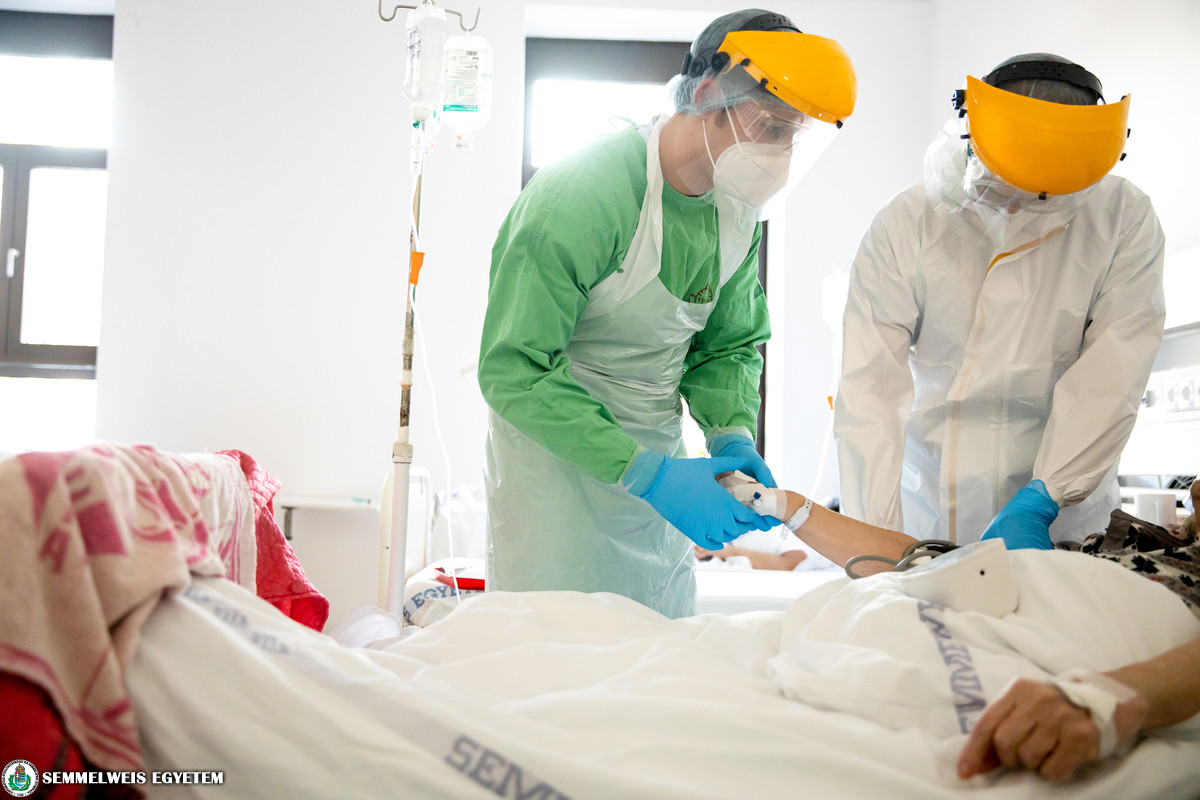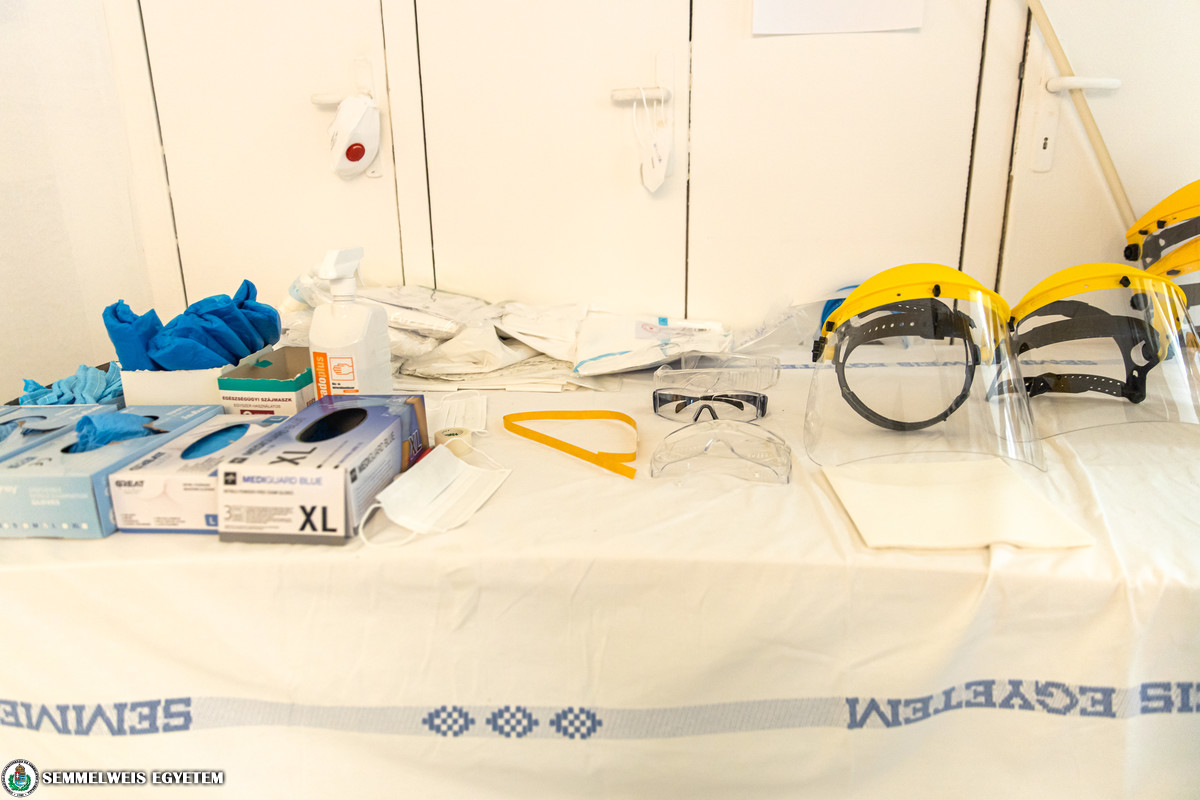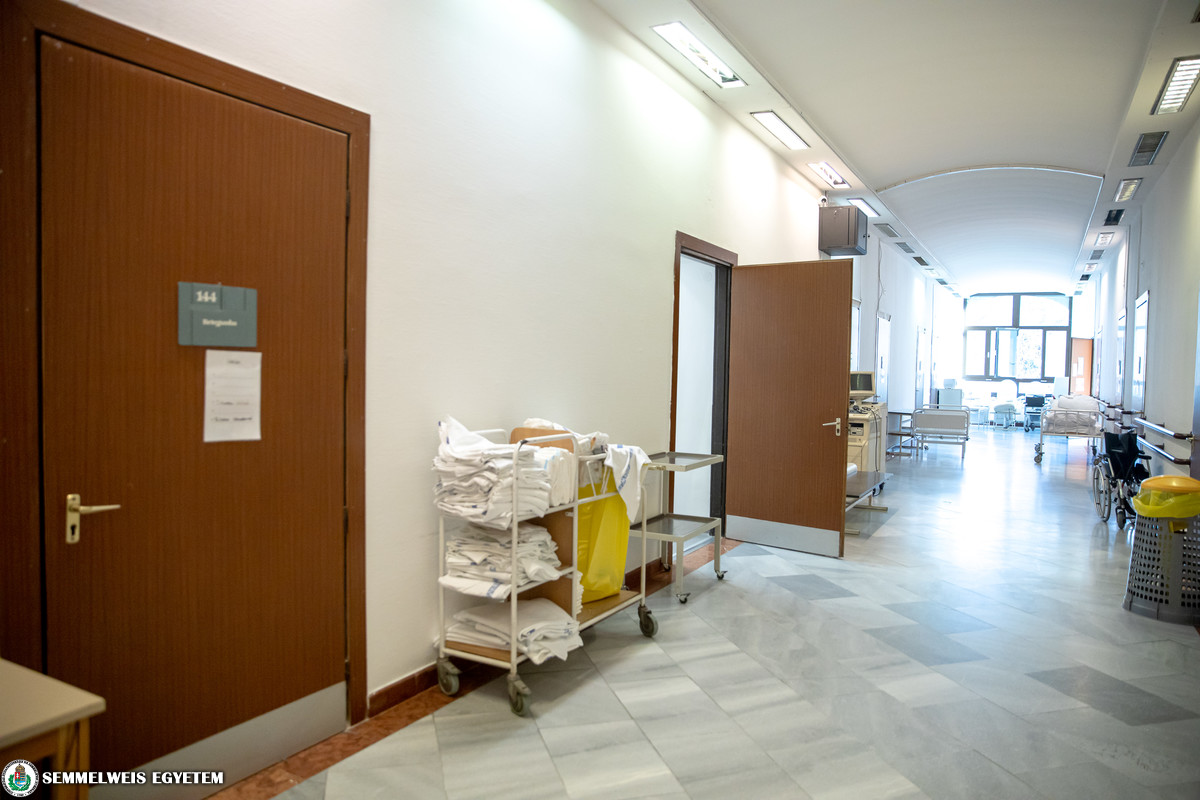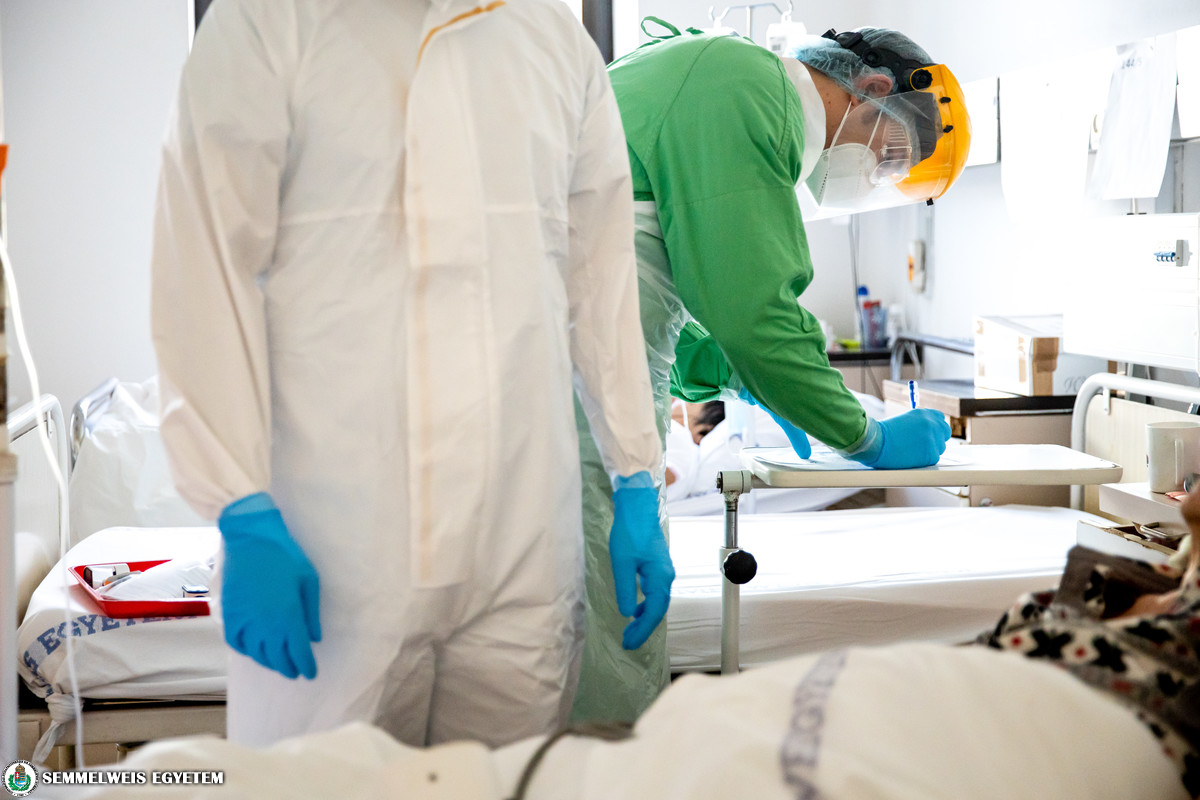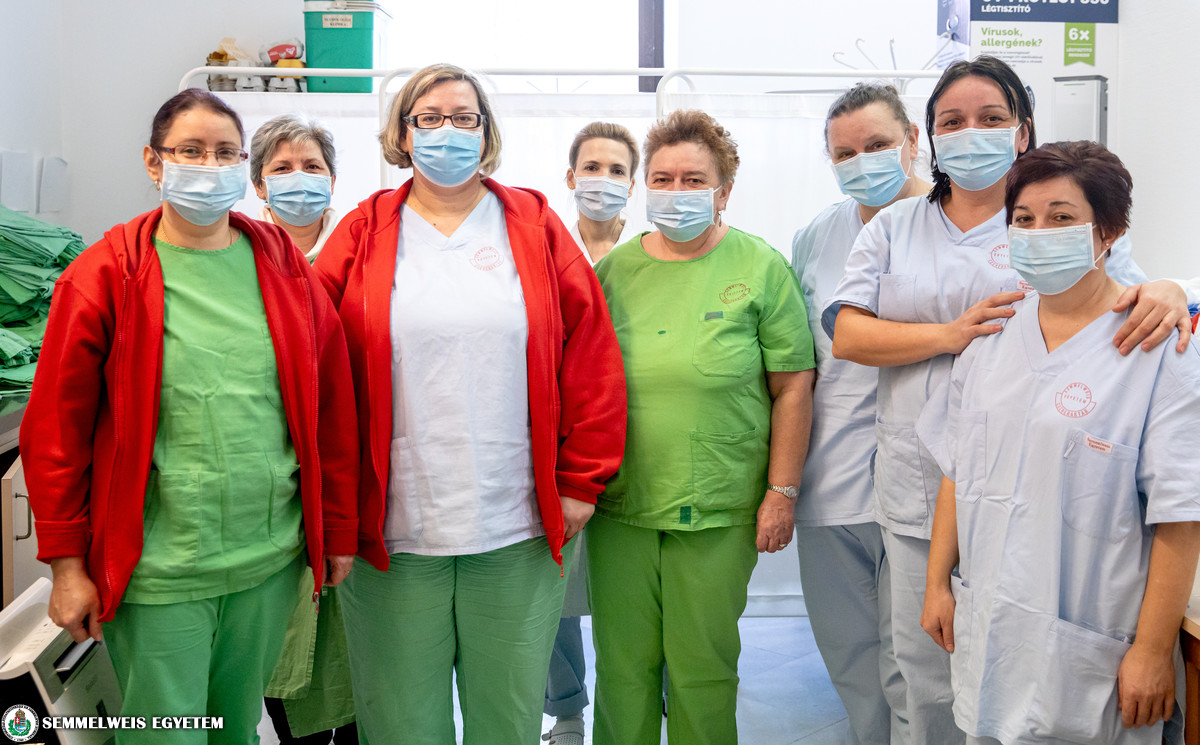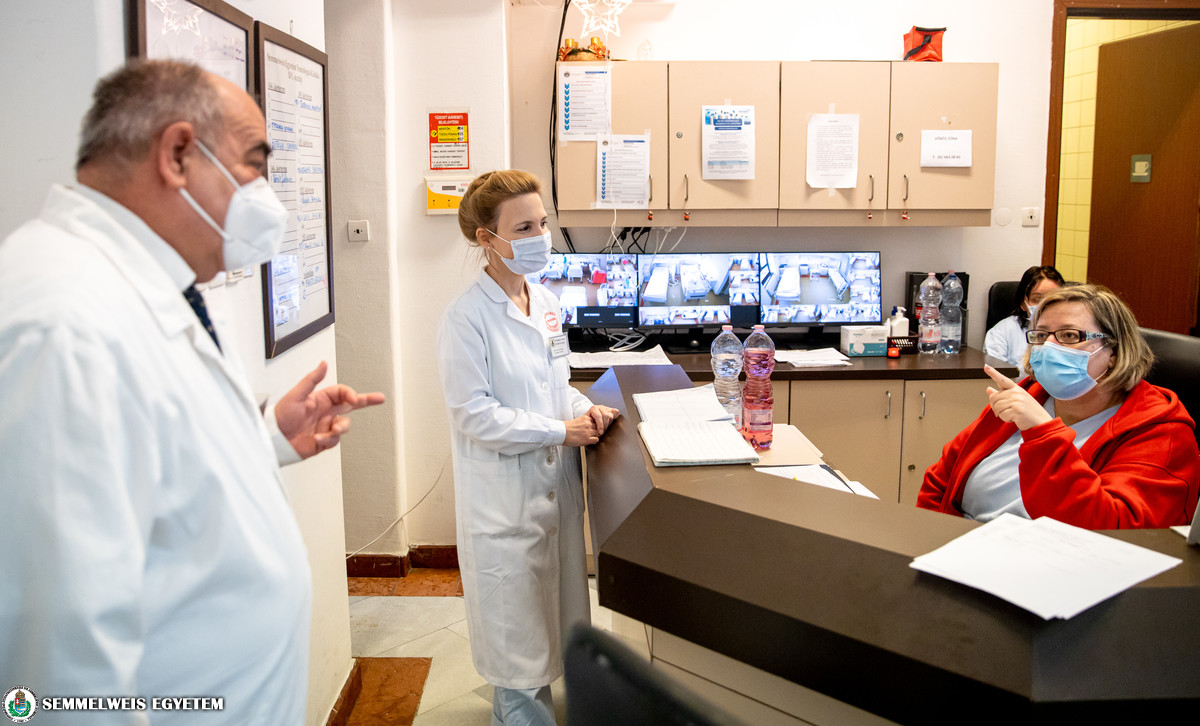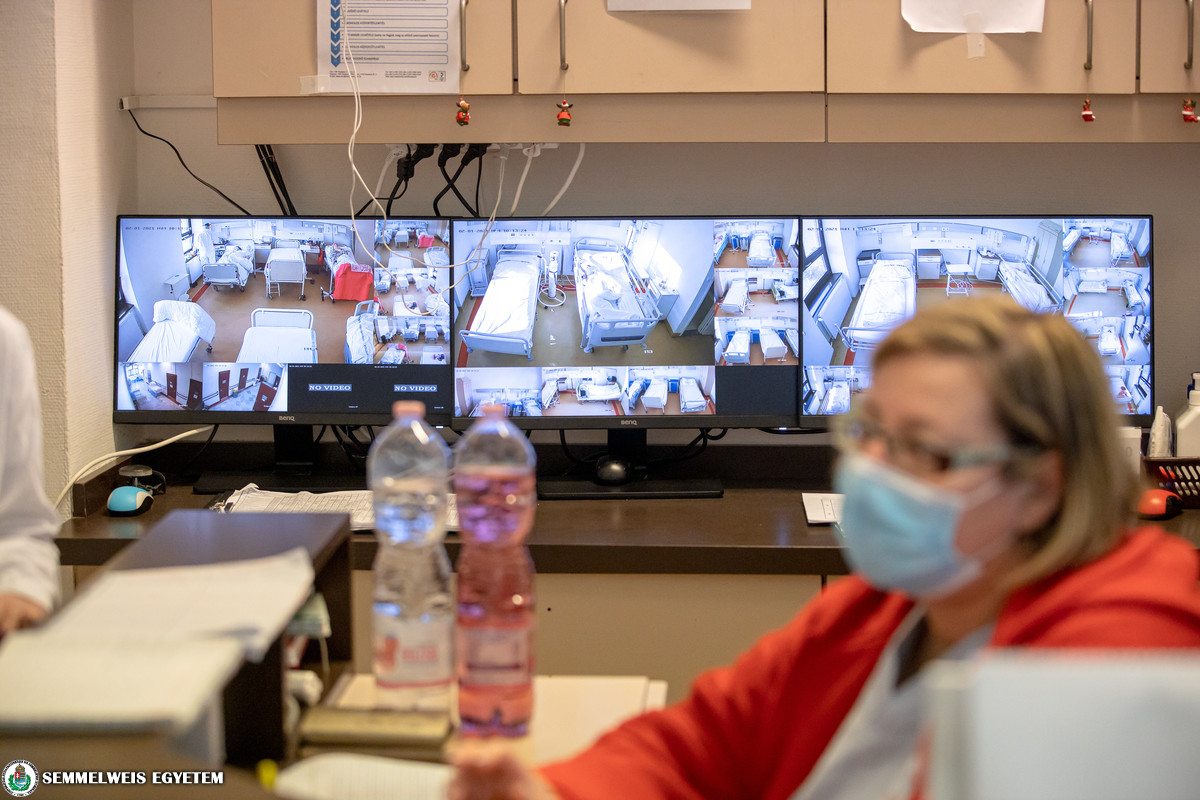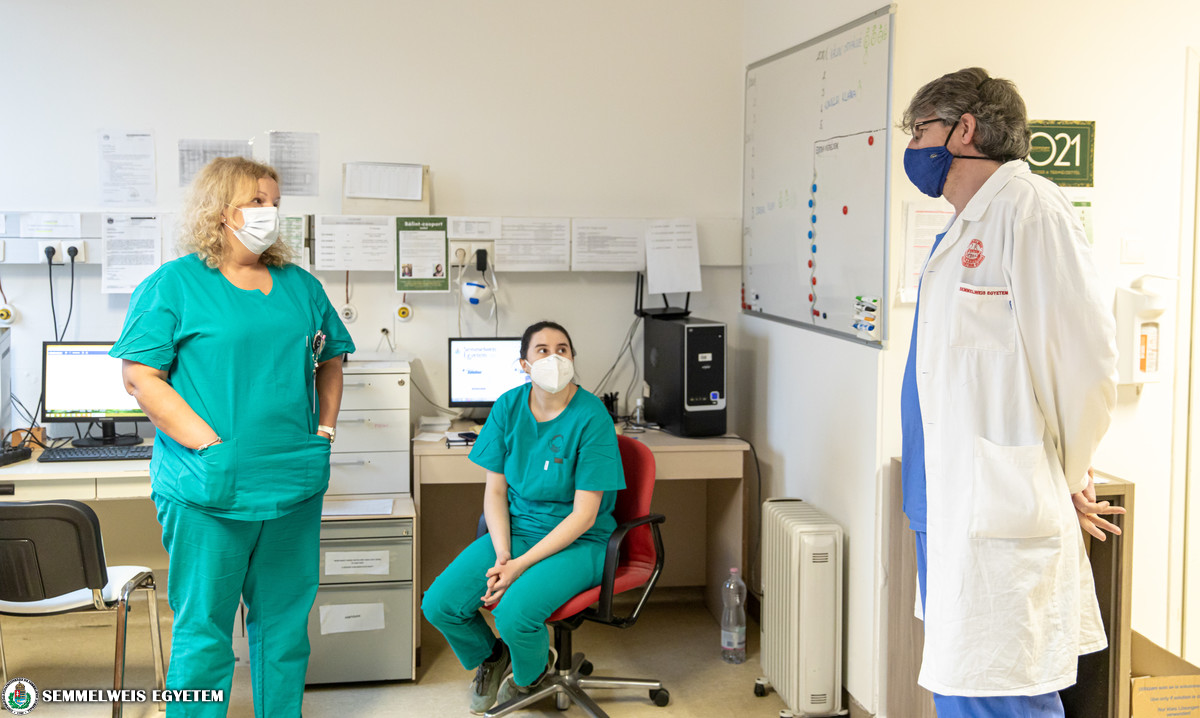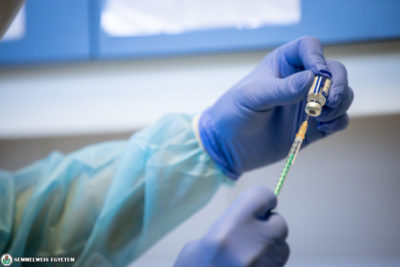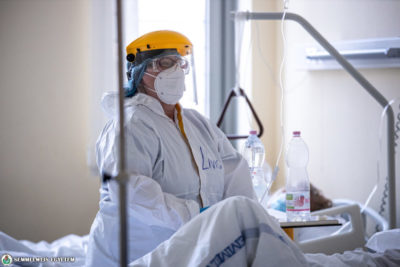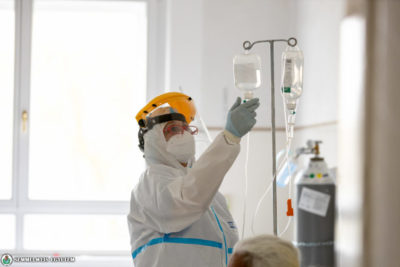The 2nd “Neuropsychiatric” Epidemic Hospital of Semmelweis University on Balassa street includes the buildings of the Department of Neurology and the Department of Psychiatry and Psychotherapy. During the first wave in the spring of 2020, only clinic-specific coronavirus care was provided at these departments, but due to the rising number of infections, an epidemic hospital was established here in the fall. In this article, COVID-19 care in the 2nd Epidemic Hospital of Semmelweis University is introduced by interviewing department heads and head nurses. They all emphasized the power of cooperation and the importance of working together, which has a key role not only in the care that is taking place here, but also in the fight against the coronavirus.
“We have learned a lot from each other and could count on each other any time”
Dr. Dániel Bereczki, Director of the Department of Neurology and Dr. János Réthelyi, Director of the Department of Psychiatry and Psychotherapy
How long have you been involved in COVID patient care? Do you remember the first case?
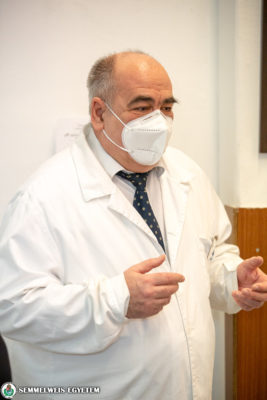 Dr. Dániel Bereczki: The first step for both the Department of Neurology and the Department of Psychiatry and Psychotherapy was to create a COVID care division within the department during the first wave in the spring of 2020, where we cared for neurological and psychiatric patients with coronavirus or suspected infection. I also remember the first cases vividly, because some of our staff members were diagnosed in the early stages of the disease and we took appropriate measures to stop the local spread of the epidemic.
Dr. Dániel Bereczki: The first step for both the Department of Neurology and the Department of Psychiatry and Psychotherapy was to create a COVID care division within the department during the first wave in the spring of 2020, where we cared for neurological and psychiatric patients with coronavirus or suspected infection. I also remember the first cases vividly, because some of our staff members were diagnosed in the early stages of the disease and we took appropriate measures to stop the local spread of the epidemic.
Dr. János Réthelyi: The Department of Psychiatry and Psychotherapy had only a few patients with coronavirus in the spring, but we had to learn the rules of infection control, as psychiatric patients are particularly vulnerable to the virus. In the autumn, during the second wave, according to the decision of the university, the building on Balassa street was transformed into an epidemic hospital. Since then, we have not only admitted psychiatric patients, but we provide general COVID care. Neurologists and psychiatrists have to perform general medical tasks related to internal medicine and infectology with the professional support of specialists of internal medicine.
What is the role of your unit in COVID-19 patient care?
Dr. Dániel Bereczki: During the spring of 2020, when we cared for neurological patients with COVID we also provided COVID care for patients coming from other neurological and psychiatric departments in Budapest. In the fall, when the building on Balassa street was transformed into an epidemic hospital, our departments completely switched to treating coronavirus patients. However, education at the university departments continued with proper safety measures and hygiene standards, as life at Semmelweis University has not stopped despite the difficult situation. Digital technologies have become more prominent, but all of our students have completed their practice trainings and exams as well, so no one had to skip a year.
Dr. János Réthelyi: The fourth- and fifth-year students helping out with nursing tasks have been of great help, just like resident doctors from other departments, who joined us based on the decision of the Clinical Center. Despite the reorganization, both departments have been able to keep on providing their own, COVID-independent specialized care as well: the Department of Neurology operates in the building of the Department of Otorhinolaryngology, Head and Neck Surgery, and the Department of Psychiatry and Psychotherapy has a division in the Szent Rókus Clinical Block, where psychiatric patients not infected with coronavirus are cared for. I am proud of all my staff, health care professionals, physicians, psychologists and everyone else, whether they have been involved in COVID care or in psychiatric care, and we are grateful for their dedicated work.
To what extent did you have to reorganize work?
Dr. Dániel Bereczki: We are practically constantly on duty, we work according to a certain procedure, when everyone knows when they have to cover for one another. Fortunately, good professional relationship between the organizational units of the Balassa street building has become even stronger and the organization of the shared on-call duty service has worked well so far. We are primarily physicians and only secondarily neurologists or psychiatrists, and although we had to get used to the new situation, my colleagues are doing a great job. Pneumonia is also common in the case of severe neurological patients, which is one of the major complications of COVID infection as well, so we have had previous experience in this area as well.
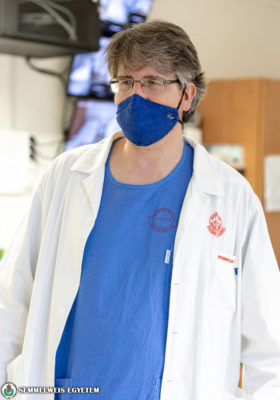 Dr. János Réthelyi: Psychiatry is sometimes considered by other medical professions as an area where somatic medicine is less important. There is no doubt that our primary task is to treat psychiatric patients. But as Dr. Bereczki also mentioned, it has been proved that with a little support, we recall the knowledge that we acquired during the 5-7 years of medical training and we are able to perform well in an emergency situation. We also received assistance from the Department of Pulmonology, the Department of Emergency Care and the Departments of Internal Medicine, while the Directorate-General of Technical Affairs provided support in tasks such as oxygen supply or the development of isolation facilities. I would like to highlight the support provided by Dr. Attila Szabó, President of the Clinical Center, Dr. József Gajdácsi, Director-General, and Dr. Péter Varga, Director-General, whom we could count on in any unexpected situations.
Dr. János Réthelyi: Psychiatry is sometimes considered by other medical professions as an area where somatic medicine is less important. There is no doubt that our primary task is to treat psychiatric patients. But as Dr. Bereczki also mentioned, it has been proved that with a little support, we recall the knowledge that we acquired during the 5-7 years of medical training and we are able to perform well in an emergency situation. We also received assistance from the Department of Pulmonology, the Department of Emergency Care and the Departments of Internal Medicine, while the Directorate-General of Technical Affairs provided support in tasks such as oxygen supply or the development of isolation facilities. I would like to highlight the support provided by Dr. Attila Szabó, President of the Clinical Center, Dr. József Gajdácsi, Director-General, and Dr. Péter Varga, Director-General, whom we could count on in any unexpected situations.
What differences do you see between the different waves of the epidemic at the department?
Dr. Dániel Bereczki: With the second and then the third wave the number of patients has increased a lot at the national level as well, which probably explains the more frequent cases of serious illness: as the number of affected patients increases, the more serious or even fatal coronavirus infections have become.
Dr. János Réthelyi: The increased number of cases also means an increased burden for those caring for coronavirus patients. COVID care is a terribly tiring job: plenty of consultations, isolation, and extra time required for putting on the protective equipment further complicate the work of colleagues, not to mention the emotional burden that those people experience who work here. That is why my psychologist colleagues organized a counseling service in the spring to help all staff members of the university and several of our colleagues needed this kind of support. Now, during the third wave, we need to gather our remaining energies, as a leader, we need to inspire our colleagues to endure this challenging situation somehow.
What are the most important lessons and experiences that will be useful in the future?
Dr. Dániel Bereczki: The care of coronavirus infection is a multidisciplinary task that affects several areas – without professional cooperation, cooperation of the clinics, departments and staff of the university, the care of this group of patients cannot work. Among the COVID care departments, the task is particularly difficult at the Department of Emergency Care and the Department of Anaesthesiology and Intensive Therapy. However, Semmelweis University has successfully faced the challenges, everyone accepted the changes brought about by the emergency situation, and a well-functioning system was established in a short time. The next step in infection control is definitely vaccination: people need to get vaccinated in a high proportion, because that is the only way to stop the epidemic.
Dr. János Réthelyi: During the epidemic an extremely close relationship has been formed not only between the Department of Psychiatry and Psychotherapy and the Department of Neurology, but also between the departments directly involved in COVID care and the organizational units that provide background support for them. We learned a lot from each other and could count on each other any time – this kind of cooperation will hopefully remain after the epidemic is over. Close contact and cooperation is needed now more than ever in the rising phase of the third wave.
“We had even more insight into each other’s work”
Katalin Hradeczky, Head Nurse, Department of Neurology and Ágnes Várszegi, Head Nurse, Department of Psychiatry and Psychotherapy
In terms of professional and nursing responsibilities, what is the biggest change that the COVID situation has brought?
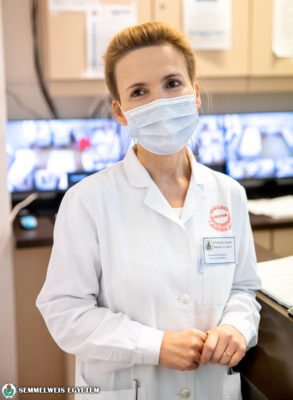 Katalin Hradeczky: The epidemic transformed the life of the department, including the work of nurses: the rapidly changing patient care environment required immediate adaptation. Schedules are tailored to the current number of patients so that everyone has the opportunity to regenerate – previously they were compiled on a monthly basis, now on a weekly basis. Nurses must always have the most relevant, up-to-date information about patient care, so daily briefings as well as internal communication are of paramount importance. During the epidemic the employees working here have been joined by health care workers and assistants from other departments, as well as by midwives and medical students. We also need to prepare them for the new tasks so that they can take part in patient care as soon as possible. We encourage all colleagues who come to us and help them integrate as soon as possible. One of the most important aspects in terms of professional tasks is to protect the health of employees, which is why compliance with hygiene regulations and the correct use of the protective equipment have become part of the everyday routine. Nursing handover, which currently takes place in the nursing room instead of the wards, has become much more detailed and also includes COVID-specific elements. In addition, nursing tasks, such as laboratory sampling, should be coordinated so that they occur with as little patient contact as possible.
Katalin Hradeczky: The epidemic transformed the life of the department, including the work of nurses: the rapidly changing patient care environment required immediate adaptation. Schedules are tailored to the current number of patients so that everyone has the opportunity to regenerate – previously they were compiled on a monthly basis, now on a weekly basis. Nurses must always have the most relevant, up-to-date information about patient care, so daily briefings as well as internal communication are of paramount importance. During the epidemic the employees working here have been joined by health care workers and assistants from other departments, as well as by midwives and medical students. We also need to prepare them for the new tasks so that they can take part in patient care as soon as possible. We encourage all colleagues who come to us and help them integrate as soon as possible. One of the most important aspects in terms of professional tasks is to protect the health of employees, which is why compliance with hygiene regulations and the correct use of the protective equipment have become part of the everyday routine. Nursing handover, which currently takes place in the nursing room instead of the wards, has become much more detailed and also includes COVID-specific elements. In addition, nursing tasks, such as laboratory sampling, should be coordinated so that they occur with as little patient contact as possible.
Ágnes Várszegi: The very first change was the transformation of our usual environment: a lock system was set up, areas were set aside for safe patient care, and cameras were installed. We had to get used to all this in addition to the introduction of the red zones indicating COVID care. The principles of nursing are similar, except for the fact that mainly patients with a poor condition are admitted instead of psychiatric patients. One of the hardest things for us is processing losses. We are very happy when patients can go home recovering from a serious condition. The departments receive several letters of gratitude written by relatives thanking us for curing their beloved family member. They mean a lot, inspire us, and help us care for patients with refreshed energies. I am very proud of our staff, our nurses, for stepping out of their comfort zone, dealing with the situation in a flexible way even if they have to work in another department. There are teams that took part in COVID care in three different departments during the three waves.
To what extent do these patients require a special nursing care?
Katalin Hradeczky: Patient care requires greater nursing capacities, which must be constantly adapted to the epidemic situation. Patients are diverse, including problems of internal medicine or urology or tumors, and many of them have caught the coronavirus in addition to their chronic illness. In addition, most of our patients have been elderly, and we have had several infected patients around the age of 100 in the recent months. In the third wave, we are experiencing a change: we have more and more younger patients arriving in a serious condition. The biggest difficulty is the increased stress and workload, which is why it is important to work in a team and help each other.
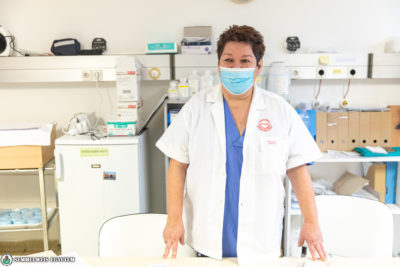 Ágnes Várszegi: Somatic care is also applied in the psychiatric ward, as there are diseases when patients require assistance to perform basic tasks. Similar care is needed in the case of patients with coronavirus. A big change, however, is that instead of our usual specialized drugs, antibiotics, antivirals, COVID-specific drugs are included in the therapies. However, the personal presence of colleagues of internal medicine is a great help.
Ágnes Várszegi: Somatic care is also applied in the psychiatric ward, as there are diseases when patients require assistance to perform basic tasks. Similar care is needed in the case of patients with coronavirus. A big change, however, is that instead of our usual specialized drugs, antibiotics, antivirals, COVID-specific drugs are included in the therapies. However, the personal presence of colleagues of internal medicine is a great help.
How does the protective equipment change processes and the way you connect with patients?
Katalin Hradeczky: Health professionals were not used to using the protective equipment before. Continuously wearing the protective equipment is stressful, as it is more difficult to move, they cause much greater fluid loss, and they also cause a feeling of isolation. Before dressing up, you must allow enough time for meals and rest. Communication is also more difficult in them, so we need to give short, clear answers to older patients with poor eyesight and hearing.
Ágnes Várszegi: Wearing protective clothing, protection goggles or a plexiglass face shield slows down work. The employees’ ears are injured by the mask, and their goggles mist up. Patients say they are cared for by people resembling astronauts, which for many can be a daunting sight in itself. Spending 4-5 hours in full protective gear is similar to a thorough aerobic exercise.
What are the most important lessons and experiences that will be useful in the future?
Katalin Hradeczky: During the epidemic, the importance of observing hygienic rules and the correct use of protective equipment has increased – their increased control will remain even after the pandemic. At the Department of Neurology, there is an exemplary collaboration between those who work here and the professionals and students who come here to help us with our work. We can get an even better insight into each other’s activities, so we not only get to know colleagues who often work in other fields, but we also value each other much more. The epidemic is still ongoing, and the work of all health workers is invaluable. Helpfulness and cooperation between the leading clinical nurses and assistants was further strengthened during the pandemic and we can always count on each other. In this unusual situation, many have been able to learn about the opportunities offered by online training and Zoom-meetings, several of which were feared in the past, but now we have all become familiar with virtual solutions, some of which are worth keeping after the epidemic.
Ágnes Várszegi: The pandemic was an unknown situation, in which the nurses’ collaboration soon became apparent: whether it was a work transfer, screening or vaccination work, my colleagues would take on the task without a word. In the first wave, we especially felt the teamwork, food donations came, our patients received puzzle newspapers, books, sweets. We did not expect applause, and we were surprised by such recognition of our work. I confess, I burst into tears when my daughter sent a recording from London showing everyone standing on their street and applauding the health care workers. I feel that the university is proud of us, and we are proud of ourselves. We have spent the last year with continuous learning and logistics, and now we feel the workload and tension even more during the third wave. We have shown that we do not let our healthcare system and our patients down, but it would also be important for us that society recognize our work and knowledge. It is worrying that the average age of the staff at the department is 47.8 years. The primary consideration would be to be able to hold on again in the event of a similar epidemic in the future.
Ádám Szabó
Photo: Attila Kovács – Semmelweis University
Translation: Katalin Illés-Romhányi
